
The Uyghurs, alternatively spelled Uighurs, Uygurs or Uigurs, are a Turkic ethnic group originating from and culturally affiliated with the general region of Central and East Asia. The Uyghurs are recognized as the titular nationality of the Xinjiang Uyghur Autonomous Region in Northwest China. They are one of China's 55 officially recognized ethnic minorities. The Uyghurs are recognized by the Chinese government as a regional minority and the titular people of Xinjiang.

East Turkestan or East Turkistan, also called Uyghuristan, is a loosely-defined geographical region in the northwestern part of the People's Republic of China, which varies in meaning by context and usage. The term was coined in the 19th century by Russian Turkologists, including Nikita Bichurin, who intended the name to replace the common Western term for the region, "Chinese Turkestan", which referred to the Tarim Basin in Southern Xinjiang or Xinjiang as a whole during the Qing dynasty. Beginning in the 17th century, Altishahr, which means "Six Cities" in Uyghur, became the Uyghur name for the Tarim Basin. Uyghurs also called the Tarim Basin "Yettishar," which means "Seven Cities," and even "Sekkizshahr", which means "Eight Cities" in Uyghur. Chinese dynasties from the Han dynasty to the Tang dynasty had called an overlapping area the "Western Regions".
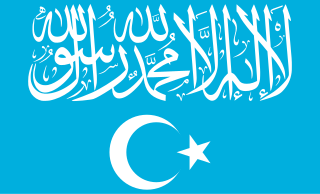
The Turkistan Islamic Party (TIP) is a Uyghur Islamic extremist organization founded in Pakistan by Hasan Mahsum. Its stated goals are to establish an Islamic state in Xinjiang and Central Asia, and eventually a caliphate.

The East Turkestan independence movement is a political movement that seeks the independence of East Turkestan, a large and sparsely-populated region in northwest China, as a nation state for the Uyghur people. The region is currently administered as a province-level subdivision of the People's Republic of China (PRC), under the official name Xinjiang Uygur Autonomous Region (XUAR). Within the movement, there is widespread support for the region to be renamed, since "Xinjiang" is seen by independence activists as a colonial name. "East Turkestan" is the best-known proposed name as it is the historical geographic name of the region and the name of the two independent states that briefly existed in the region in the first half of the 20th century.
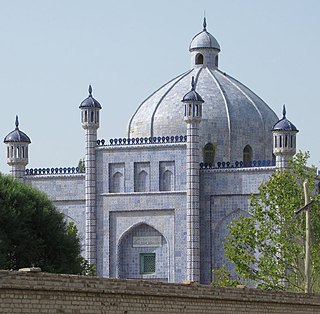
Artux, Artush or Atush is a county-level city and the capital of Kizilsu Kyrgyz Autonomous Prefecture in Xinjiang, China. The government seat is in Guangming Road Subdistrict. As of 2018, it has a population of 285,507 people, 81.4 per cent of whom are Uyghurs.

The Uyghur American Association is a prominent Uyghur American non-profit advocacy organization based in Washington, D. C. in the United States. It was established in 1998 by a group of Uyghur overseas activists to raise the public awareness of the Uyghur people, who primarily reside in Xinjiang, China, also known as East Turkestan. The Uyghur American Association is an affiliate organization of the World Uyghur Congress and works to promote the Uyghur culture and improved human rights conditions for Uyghurs.

Isa Yusuf Alptekin was a Uyghur politician who served in the Chinese Nationalist government and supported the Islamist pan-Turkic First East Turkistan Republic but he opposed the Second East Turkestan Republic because it was run by pro-Soviet Communist Uyghurs. When Xinjiang came under communist control in 1949, Alptekin went into exile and became an ultra-nationalist and pan-Turkic separatist.

The January 2007 Xinjiang raid was carried out on January 5, 2007, by Chinese paramilitary police against a suspected East Turkestan Islamic Movement (ETIM) training camp in Akto County in the Pamir plateau.
Terrorism in China refers to the use or threatened use of violence to effect political or ideological change in the People's Republic of China. The definition of terrorism differs among scholars, between international and national bodies and across time and there is no legally binding definition internationally. In the cultural setting of China, the term is relatively new and ambiguous.
The incorporation of Xinjiang into the People's Republic of China, known in Chinese historiography as the Peaceful Liberation of Xinjiang, was the takeover of the Second East Turkestan Republic as well as the rest of Xinjiang Province under the control of the Republic of China by the Chinese Communist Party (CCP) and its People's Liberation Army (PLA), largely through political means, in the waning days of the Chinese Civil War.

The World Uyghur Congress (WUC) is an international organization of exiled Uyghur groups that claims to "represent the collective interest of the Uyghur people" both inside and outside of the Xinjiang Uyghur Autonomous Region of the People's Republic of China. The World Uyghur Congress claims to be a nonviolent and peaceful movement that opposes what it considers to be the Chinese "occupation" of 'East Turkestan' and advocates rejection of totalitarianism, religious intolerance and terrorism as an instrument of policy. The Congress is funded in part by the National Endowment for Democracy or NED of the United States. It has been designated as a terrorist organization by China since 2003 for conspiring with separatists and religious extremists to plan terror attacks.

The Kökbayraq is a flag used unofficially to represent the historic region of East Turkestan in Central Asia. The flag was originally used as the national flag of the short-lived breakaway state known as the First East Turkestan Republic (1933–1934). The Kökbayraq has a white crescent with a five pointed star on blue background, it was adopted on 12 November 1933 as the national flag of the First East Turkestan Republic during Declaration of independence. With the exception of the blue background, the flag is identical to the Flag of Turkey. Uyghurs in Kyrgyzstan and Pakistan fly the flag as their ethnic flag.
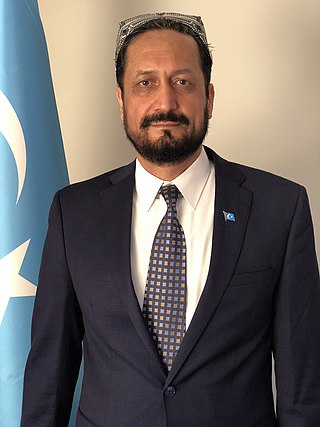
Anwar Yusuf Turani is a self proclaimed ethnic Uyghur nationalist and separatist leader. Born into a family branded counter-revolutionary by the Chinese government, Turani was raised in a labor camp where he faced economic hardship and political oppression. He attended Kashgar Teacher's College and graduated from the Department of Physics in July 1983. Turani came to the United States on August 12, 1988 and became the first Uyghur political asylee. In 1995, he established the East Turkistan National Freedom Center (ETNFC), a non-profit human rights organization based in Washington, D.C. He is the first person to start the East Turkistan independence movement in the United States. Having spearheaded the formation of the East Turkistan Government in Exile (ETGE) on September 14, 2004 in Washington, D.C., Turani went on to become the first Prime Minister of the entity.
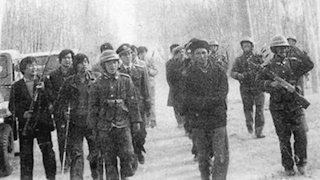
The Barin uprising was an armed conflict between Uyghur militants and Chinese government forces from 4 to 10 April 1990 in the township of Barin in Xinjiang, China. Violence began on the evening of 4 April, when a group of 200 to 300 Uyghur men attempted to breach the gates of the local government office in a protest against forced abortions of Uyghur women and Chinese rule in Xinjiang. The arrival of 130 armed police to quell the unrest was immediately met with armed resistance by militants among the crowd. Initial clashes that evening left six policemen dead and 13 wounded. The militants also captured five policemen, while the armed police captured 19 militants.
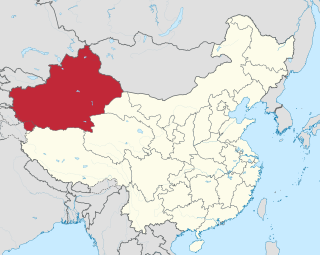
The Xinjiang conflict, also known as the East Turkistan conflict, Uyghur–Chinese conflict or Sino-East Turkistan conflict, is an ongoing ethnic geopolitical conflict in what is now China's far-northwest autonomous region of Xinjiang, also known as East Turkistan. It is centred around the Uyghurs, a Turkic ethnic group who constitute a plurality of the region's population.
The East Turkistan National Movement also known as the East Turkistan National Awakening Movement is a non-profit human rights and political advocacy organization established in June 2017 in Washington D.C. Salih Hudayar, a Uyghur American consultant and graduate student founded the group after pre-existing Uyghur organizations failed to openly call for East Turkestan independence deeming it "controversial".

The Chinese government has committed a series of ongoing human rights abuses against Uyghurs and other ethnic and religious minorities in Xinjiang that is often characterized as genocide. Beginning in 2014, the Chinese government, under the administration of Chinese Communist Party (CCP) General Secretary Xi Jinping, incarcerated more than an estimated one million Turkic Muslims without any legal process in internment camps. Operations from 2016 to 2021 were led by Xinjiang CCP Secretary Chen Quanguo. It is the largest-scale detention of ethnic and religious minorities since World War II. The Chinese government began to wind down the camps in 2019. Amnesty International states that detainees have been increasingly transferred to the formal penal system.
The Uyghurs in Turkey are members of the Uyghur diaspora that live in Turkey.

Salih Hudayar is a Uyghur American politician known for advocating for East Turkistan independence. He founded the East Turkistan National Awakening Movement and has since been leading the movement calling for the "restoration of East Turkistan's independence."

The East Turkistan Government-in-Exile, also known as the Government-in-Exile of the Republic of East Turkistan, is a parliamentary-based exile government established and headquartered in Washington, D.C. by Uyghurs, Kazakhs, and other peoples from East Turkistan (Xinjiang). The ETGE claims to be the sole legitimate organization representing East Turkistan and its people on the international stage.


















